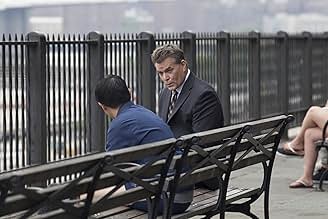ÉVALUATION IMDb
5,3/10
4,4 k
MA NOTE
Ajouter une intrigue dans votre langueTwo best friends rise through the ranks of New York's Chinese underworld in the 1980s.Two best friends rise through the ranks of New York's Chinese underworld in the 1980s.Two best friends rise through the ranks of New York's Chinese underworld in the 1980s.
Jin Au-Yeung
- Detective Tang
- (as Jin Auyeung)
Histoire
Le saviez-vous
- AnecdotesThe first film Wai Keung Lau and Martin Scorsese officially work on together (after Wai Keung Lau's Affaires internes (2002) inspired Martin Scorsese's Agents troubles (2006)).
- GaffesIn the beginning of the movie its supposed to be 1983, however they show a big pile of modern US currency spilling on table with the current large President's head on the bills.
- ConnexionsFeatures Xue xi Tang Ren Jie (1982)
- Bandes originalesGreen Dragon
Written by Devon Diep, Angelo "DOC" Velazquez & Terri Patterson
Performed by Devon Diep
Courtesy of Cutting Edge Music (Holdings) Limited
Commentaire en vedette
I feel like the writer (Michael Di Jiacomo) created a solid art house film beginning with a dramatic true story from a newspaper article, about a Chinese gang in nyc during the 80's and 90's, but only uses this as a point of departure to tell another poetic and intricately woven meditation on immigration, race and class which could easily pertain to any immigrant group. But he really took the story to another level with his soulful shamanic protagonist, Sonny (Justin Chon), who oddly maintains his purity and innocence against a harsh tapestry of brutality and violence, as he tragically explores ideas of identity, family, and the universal mechanisms by which human alliances in society are built and broken.
But maybe the producers were a bit afraid Jiacomo's vision would not be marketable enough, and so they tried to thinly disguise this brilliant, complex, touching, and highly nuanced script, sometimes as a detective story, and at other times as a shoot em' up action flick, and occasionally even as a schlocky melodrama. None of these other genres quite worked out however, and it seems that viewers and critics walked away confused, and the film did not receive the recognition it deserves.
But who knows, the art film it was intended to be may never seen the light of day. It is interesting to note how movies are made through an intersection of artists, investors, marketing people, and public opinion and trends. In fact, any group in society forms organically in a similar way. We cling to one another first for survival, perhaps for love, then for defense and maybe later, domination, and then again for love.
If you squint while watching, maybe you can catch a glimpse of what this film was supposed to be. Yet you can certainly appreciate it for what it is. There are so many powerful nuances such as the role of the middle class Chinese detective (Jin Au-Yeung) constantly experiencing different forms of racism from the white detectives, who are petty enough to even steal his recognition to be named on the front page of the newspaper. At times he seems opportunistic and self serving but at other times you realize he is a mirror to the other characters (they are often seated face to face) and is also struggling for his identity in a society which does not welcome him for being Chinese. The way that Snakehead Mama (Eugenia Yuan) lives in an elegant home sipping from a European teacup while her gang of enforcers live in squalor slurping noodles. In another scene she calmly orders brutal murders of Chinese who have been disobedient to the "family." Later she snarls "I am the American the dream."
The peaceful and philosophical businessman, Paul (Harry Shum), politely bows to his victims before ordering their murder, and is described as not a leader, but a religion. At the bottom rung is Steven (Kevin Wu), who is so badly damaged he has become a psychopathic maniac. Yet, Steven's ruthless murderous inclinations are the source of power, privilege and prestige for the others in the hierarchy. Yet, he is hardly a cold, cruel and calculated killer -- his emotions are so intense they are constantly overflowing. He literally exclaims angrily in one scene, "you don't think I feel?" His killing is an uncontrollable mixture of intense rage and sadness, as if he has made the choice to personally bear the burden of the others' pain collectively, so they may be relieved of it and can have the luxury to behave civilly.
There are some difficult scenes involving torture and rape which are hard to watch. But from what I gather this is based on a true story and these scenes are necessary to provide insight into the reality of historic and cultural events. That being said, it is not anywhere near as bad as a Tarantino flick and about the same as Apocalypse Now or the Godfathers. Thankfully there was no gratuitous sex or exploitation of women. I felt the ending was a bit unsatisfying but not terrible. I feel this is an important film as there is virtually no media attention to these Chinese gangs and they are an overlooked part of history. Furthermore, I think this a very important film to watch for anyone interested in exploring immigration, race and imperialism.
The obvious take away is that the more we outlaw immigrants, marginalize them, and prohibit law enforcement from protecting their rights, we are turning our bank on innocent families and children who can easily become subject to slavery, abuse, rape, and murder. This is not just happening to the Chinese is New York in the 80's - this is happening now.
But maybe the producers were a bit afraid Jiacomo's vision would not be marketable enough, and so they tried to thinly disguise this brilliant, complex, touching, and highly nuanced script, sometimes as a detective story, and at other times as a shoot em' up action flick, and occasionally even as a schlocky melodrama. None of these other genres quite worked out however, and it seems that viewers and critics walked away confused, and the film did not receive the recognition it deserves.
But who knows, the art film it was intended to be may never seen the light of day. It is interesting to note how movies are made through an intersection of artists, investors, marketing people, and public opinion and trends. In fact, any group in society forms organically in a similar way. We cling to one another first for survival, perhaps for love, then for defense and maybe later, domination, and then again for love.
If you squint while watching, maybe you can catch a glimpse of what this film was supposed to be. Yet you can certainly appreciate it for what it is. There are so many powerful nuances such as the role of the middle class Chinese detective (Jin Au-Yeung) constantly experiencing different forms of racism from the white detectives, who are petty enough to even steal his recognition to be named on the front page of the newspaper. At times he seems opportunistic and self serving but at other times you realize he is a mirror to the other characters (they are often seated face to face) and is also struggling for his identity in a society which does not welcome him for being Chinese. The way that Snakehead Mama (Eugenia Yuan) lives in an elegant home sipping from a European teacup while her gang of enforcers live in squalor slurping noodles. In another scene she calmly orders brutal murders of Chinese who have been disobedient to the "family." Later she snarls "I am the American the dream."
The peaceful and philosophical businessman, Paul (Harry Shum), politely bows to his victims before ordering their murder, and is described as not a leader, but a religion. At the bottom rung is Steven (Kevin Wu), who is so badly damaged he has become a psychopathic maniac. Yet, Steven's ruthless murderous inclinations are the source of power, privilege and prestige for the others in the hierarchy. Yet, he is hardly a cold, cruel and calculated killer -- his emotions are so intense they are constantly overflowing. He literally exclaims angrily in one scene, "you don't think I feel?" His killing is an uncontrollable mixture of intense rage and sadness, as if he has made the choice to personally bear the burden of the others' pain collectively, so they may be relieved of it and can have the luxury to behave civilly.
There are some difficult scenes involving torture and rape which are hard to watch. But from what I gather this is based on a true story and these scenes are necessary to provide insight into the reality of historic and cultural events. That being said, it is not anywhere near as bad as a Tarantino flick and about the same as Apocalypse Now or the Godfathers. Thankfully there was no gratuitous sex or exploitation of women. I felt the ending was a bit unsatisfying but not terrible. I feel this is an important film as there is virtually no media attention to these Chinese gangs and they are an overlooked part of history. Furthermore, I think this a very important film to watch for anyone interested in exploring immigration, race and imperialism.
The obvious take away is that the more we outlaw immigrants, marginalize them, and prohibit law enforcement from protecting their rights, we are turning our bank on innocent families and children who can easily become subject to slavery, abuse, rape, and murder. This is not just happening to the Chinese is New York in the 80's - this is happening now.
- chaosisdenial
- 1 août 2018
- Lien permanent
Meilleurs choix
Connectez-vous pour évaluer et surveiller les recommandations personnalisées
- How long is Revenge of the Green Dragons?Propulsé par Alexa
Détails
- Date de sortie
- Pays d’origine
- Sites officiels
- Langues
- Aussi connu sous le nom de
- Revenge of the Green Dragons
- Lieux de tournage
- sociétés de production
- Consultez plus de crédits d'entreprise sur IMDbPro
Box-office
- Budget
- 5 000 000 $ US (estimation)
- Brut – à l'échelle mondiale
- 107 412 $ US
- Durée1 heure 34 minutes
- Couleur
- Mixage
- Rapport de forme
- 2.35 : 1
Contribuer à cette page
Suggérer une modification ou ajouter du contenu manquant

Lacune principale
By what name was La vengeance des dragons verts (2014) officially released in India in English?
Répondre








































